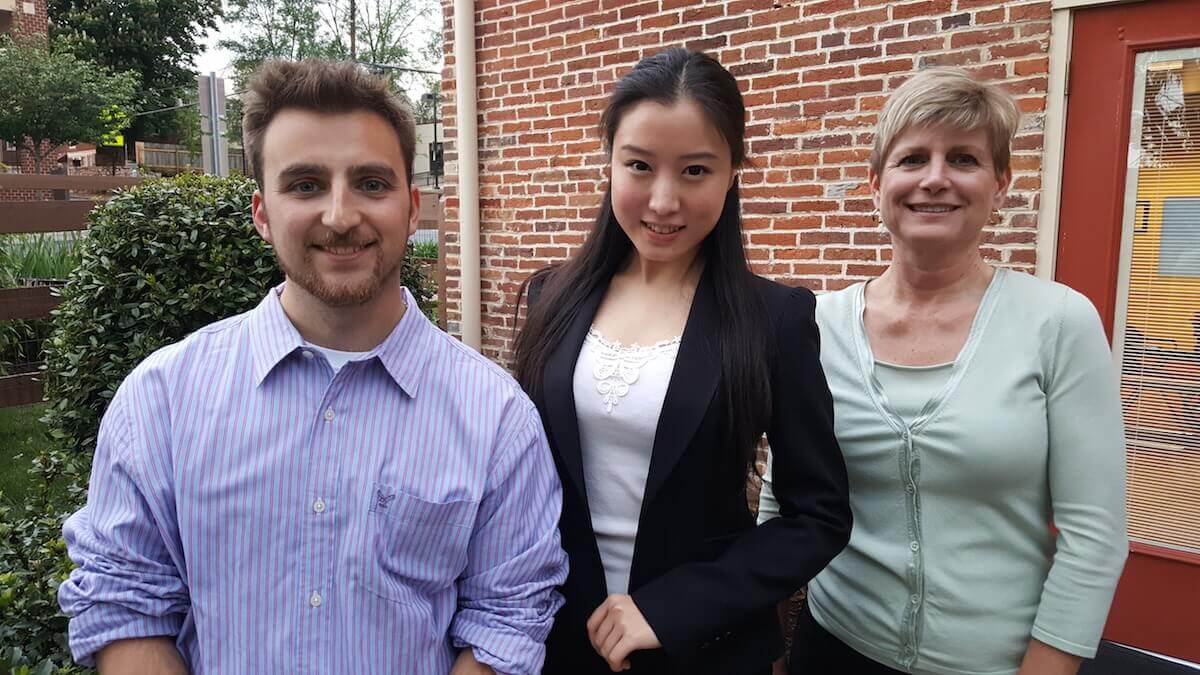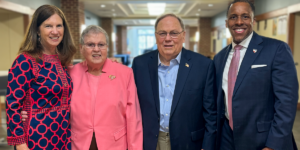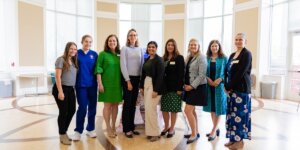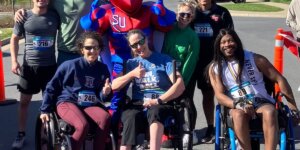How can Literacy Volunteers Winchester Area (LVWA) profitably address unmet job literacy needs within the Winchester-Frederick County area? That’s the question Master of Business Administration students (above, from left to right) Collin Sack ’13, ’14, ’16, Jing Kang ’16, and Teresa “Terri” Cluss ’16, explored throughout their MBA capstone course during the spring 2016 semester.
Guided by Assistant Professor of Management Bret Sanner, Ph.D., with input from LVWA Executive Director Kim Herbstritt, the group was asked to assist LVWA in developing a business plan for turning the LVWA job literacy initiative into a revenue stream for the organization.
“Colin, Jing and Terri are a very special group of students,” said Dr. Sanner. “They were given a complex and ambiguous problem that many people would have run away from. Instead, they dug-in and used solid strategic thinking to develop a brilliant and complete solution.”
Earlier this month, the group presented its market research and program proposal to board members from LVWA, a nonprofit group dedicated to improving the local community by advancing essential literacy skills for adults through education and advocacy.
“It was a great learning experience for us,” said Sack.
The group studied LVWA’s capabilities and program offerings, and then surveyed and interviewed human resources professionals in local industries (manufacturing and transportation/warehousing) to find out what skills employees need and whether employers would find LVWA services desirable and pay for them.
The responses showed that most of the employers are open to LVWA services, and that the skills their employees need most include basic English language skills (reading and writing), basic math skills, basic computer skills, and strategies for self-motivation and teamwork.
The students advised LVWA to provide programs customized for different businesses with measurable results and outcomes. The group synthesized all of its information and used it to design a program for LVWA that would enable LVWA to “be the provider of choice by businesses located in the Winchester-Frederick County markets for providing job literacy skills.”
The proposed program would build on LVWA’s current resources, as well as develop additional programs to meet area business needs.
The program proposal came complete with a vision, mission, strategy and value proposition, as well as target customers, a projected list of classes and add-ons to offer and a monetary value for each. It included a breakdown of how the program offerings compare to other workforce education programs in the area, as well as go-to-market plan and a timeline for implementing a pilot program.
“In order for a program like this to work, you would need to have 100 percent board support,” Cluss told the LVWA board during the presentation. “We would recommend that you form a committee, not just from your board, but pulling from within the community – people who have expertise in different areas.”
Cluss also advised that it would take a lot of time to develop and implement the program, as well as time and effort to establish relationships with local businesses, which would be an integral part of getting the program off the ground.
“We don’t recommend that you dive in head first,” said Cluss. “Stick your toe in the water and see how it feels. Find a business that you can develop a close relationship with. Someone that will work with you, knowing that you’re testing this out, and they’re going to be willing to give you as much feedback as possible – positive, negative, whatever it is – to help make it a better program.”
“We’ve created a really nice partnership with, specifically, Dr. Sanner, and I think there are certainly going to be other opportunities for projects. I think with this one, it’s really going to be on us to now take it and put the meat on the bones and get out there and launch it,” said Herbstritt.
“There’s clearly a need, so I think it makes sense to move down this road, but it is something that’s going to take time,” she added. “We are stepping way outside of what our typical curriculum would be and creating something special and new for these businesses.”




